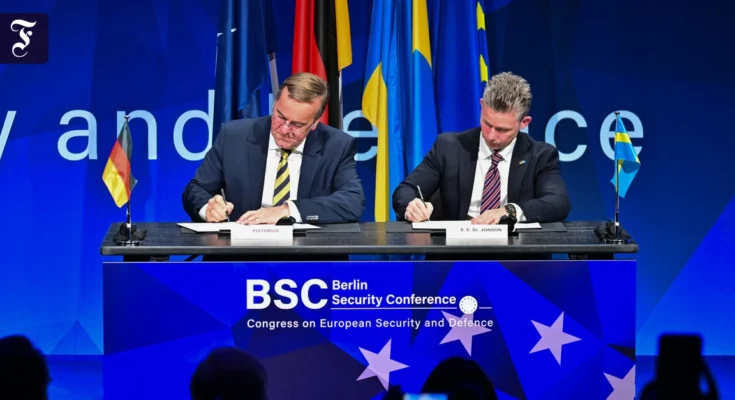Germany and Sweden want to further expand their bilateral cooperation on security policy issues. The defense ministers of both countries, Pål Jonson and Boris Pistorius (SPD), have signed a joint document.
Closer cooperation on weapons projects has been agreed. The two armies should be able to train and fight with each other in a better network, and joint training projects are also planned. Pistorius has signed several similar agreements in recent months, including with Britain, to enable closer cooperation beyond the NATO and European Union frameworks. The UK and Iceland agreed that the Navy’s new maritime patrol aircraft could be landed and supplied to each country in the future, significantly increasing their operational radius for mutual security.
The Air Force’s Eurofighters have also trained with Swedish partners, a commitment experts believe is more helpful to mutual security than trips like the current one to New Zealand.
Jonson: Need to take more responsibility
Regarding possible weapons cooperation, attention is also focused on Sweden’s plans for the development of a 6th generation fighter aircraft system. Sweden has its own modern jet, the Saab JAS 39 Gripen E. However, the country, which has a strong national defense industry, is faced with the decision of whether it wants to develop and build its own next generation fighter aircraft. Sweden could also participate in other European projects.
However, some time ago, the Scandinavian country withdrew from the Tempest aircraft project which, among others, was operated by the UK. Among other things, there is an impression in Sweden that the long term of the project cannot be adapted to current needs. Joining the German-French-Spanish FCAS project is considered impossible due to current difficulties. However, there may be new constellations after FCAS ends in its current form. A new decision will be made in Stockholm around 2028.
Pistorius said that Sweden was one of Germany’s closest partners and that cooperation was characterized by “deep trust, open exchanges and shared beliefs. Nothing can be taken for granted. Not anymore.” Cooperation is essential because Russian aggression is no longer limited regionally: “The Baltic Sea is becoming an area of confrontation.”
Swedish Defense Minister Jonson stressed: “We must take more responsibility. We have been dependent on American military power for too long and now we must strengthen Europe’s defense together.” Germany and Sweden are two countries whose defense industry is capable of realizing all dimensions: ships, armored vehicles and aircraft.
Relations are already close in the maritime sector
The Swedish government, as well as Swedish industry, currently has a large number of representatives in Berlin to take part in security conferences and trade fairs of which Sweden is a partner country. Among others, Swedish Prime Minister Ulf Kristersson and Commander-in-Chief of the Swedish Armed Forces Michael Claesson will take part in the event. The topic of the conference was the risk of Russian aggression, for example in the Baltics or the Far North, but also the task of European countries in strengthening their common defense within NATO.
After 200 years of freedom from the alliance, Sweden joined NATO in 2022 following Russia’s attack on Ukraine and is now increasingly integrated into the alliance structure. However, considering developments in the United States, hopes for full American protection after joining NATO were only partially fulfilled, although no doubts were officially expressed.
German-Swedish relations are close, especially in the maritime field; the Swedish and German navies cooperate in monitoring sea routes in the North Sea, and German submarines use the Karlskrona military base in southern Sweden.



